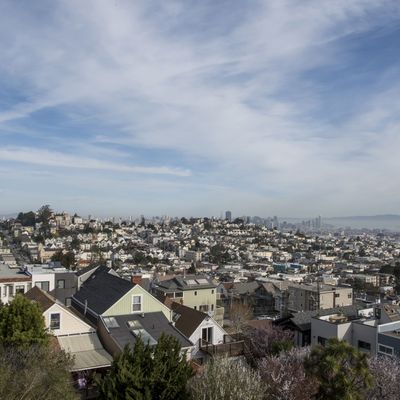
Several years ago, a fired-up young activist came to my door asking me to sign a petition opposing the construction of a new apartment building in the neighborhood. The new building was to occupy what had been, for many years, a vacant lot along a major thoroughfare. If the building (which now exists, and is quite lovely) could not go up without generating neighborhood ire, it is hard to imagine where new housing in a major city would not cause local resistance.
The difficulty of increasing housing supply is a problem across major American cities, especially on the coasts, but also in many non-coastal university towns and other prosperous areas. In California, the problem has taken on crisis dimensions. Cities have grown unaffordable, and the main barrier to firms that have many new jobs to offer is finding housing for potential employees. The state’s economy is losing $140 billion a year.
The state’s legislature killed a bill to alleviate the housing crisis. The bill, S.B. 827, would have forced cities to allow denser construction of housing within walking distance of mass transit. The reform would have brought multiple benefits: the social benefit of reducing housing costs by increasing supply; the economic benefit of opening the major bottleneck to job creation (and with it, more tax revenue); and the environmental benefit, allowing more people to live in energy-efficient apartments that don’t require driving everywhere.
California Republicans opposed S.B. 827. But Republicans, by and large, were not and are not the problem. California is a one-party, Democratic state. And many other cities facing a shortage of housing are likewise run by Democrats, as most cities tend to be. The state’s leading Democratic gubernatorial candidates, and even — perversely — some of its environmental and low-income housing advocates opposed the bill. The larger issue is that too many Democrats have taken a misguided, knee-jerk defense of the restrictive zoning policies that have perpetuated the urban housing crisis.
The arguments connected to this question can become very detailed and dense. You can dive in to the details if you want, but the bottom-line conclusion is quite simple: Housing is too expensive in many cities because there isn’t enough of it. There isn’t enough of it because zoning and other regulations prevent the construction of high-density housing. The crisis is especially dramatic in the Bay Area, where land is fantastically expensive and filled up with single-family houses. Easing those regulations, as S.B. 827 would have done, would allow more housing and, hence, lower rents.
Opponents of allowing more dense housing construction associate the solution with gentrification, but this gets the question backwards. Gentrification is the result of artificially constricted housing supply, which pushes the demand for new housing into poorer neighborhoods, where new entrants outbid existing renters. Rampant gentrification is what happens when yuppies win a zero-sum competition for housing. Expanding the supply of housing allows people to move in to cities without displacing existing residents. The simple Econ 101 model of supply and demand does not solve every problem, but it does solve this one.
Why don’t we do it? One reason is that, for the most part, nobody likes building anything new. Zoning questions tend to be dominated by local NIMBYs. But even where activists have managed to broaden the question — like in California, where they brought a bill to the state level — it turns out that progressives are susceptible to NIMBYist rhetoric. Allowing the construction of more multifamily housing means relaxing — gasp — regulations. And it means working with — gasp — developers.
The controversy in California and other Democratic-dominated areas has been heavily infused with instinctive support for existing regulation, and distrust of business as a malignant force. It doesn’t matter to distrustful residents that the regulations in question are deeply antisocial, and reinforce a status quo that forces people to live in energy-hogging sprawled-out exurbs, and restricts access to cities to people already fortunate enough to reside there.
The zoning crisis is ultimately a question of whether the most prosperous parts of blue America can be opened up to new entrants, or whether they will remain closed off and increasingly unaffordable. It is also a political test for whether progressives will be manipulated by knee-jerk suspicions, or be able to think clearly about using the market to serve human needs.






























